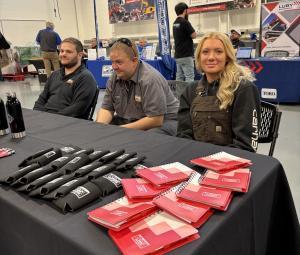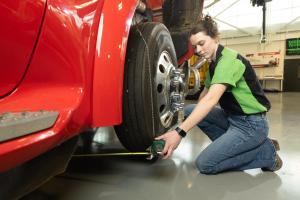Revving toward the future
Like a diesel engine that’s been carefully fine-tuned — its timing just right, systems calibrated and every component working in harmony — LLCC’s inaugural class of diesel technologies students will cross the stage at commencement. Their degrees are a representation of two years of adjustment, learning and persistence. Like the engines they work on, both are built for endurance, ready to take on heavy loads and prepared to run strong for the long haul.

“The part of the program I enjoyed most was working in the lab,” explained Shannon Smaga, one of 19 graduating diesel tech students. “A lot of other schools don't offer the hands-on experience that I got through LLCC. We got to tear down engines to the bare block, troubleshoot and diagnose issues on actual machines, perform electrical testing on live circuits and so much more. Learning about these systems in the classroom and actually being able to go out and apply them to the real thing helped advance my understanding of the topic much further.”
Smaga accepted a job offer with Rush Truck Centers in Springfield, even before completing the first year of the program.
Launched in the fall 2023 to meet growing industry demand, the LLCC Diesel Technologies program was built from the ground up in response to a shortage of skilled diesel technicians across the region. What began as a vision — fueled by employer partnerships, grant funding and passionate faculty — has now taken real shape in the form of graduates like Smaga, with associate of applied science (AAS) degrees in hand and job offers in their pockets.
“Watching this first group cross the finish line makes me incredibly proud,” said Jeff Gardner, program director. “These students took a chance on a brand-new program, put in the hard work and have proved what is possible. They’re not just graduates – they’re pioneers.”
According to the Bureau of Labor Statistics, diesel technicians and mechanics can expect to make a minimum salary of $60,000 a year immediately, and there is projected job growth of 3% over the next 10 years.

Erin Barrick, another graduate in the inaugural class, plans to run her family’s trucking company. “I have gained so much knowledge from this program that I am set up for success in working on and maintaining my own fleet of trucks."
Both grads have some advice for those contemplating the program — do it.
“You will learn everything about diesel technologies, make lasting friendships, complete valuable certifications, master important skills and network with hundreds of industry professionals,” said Barrick.
“LLCC provided me with all the help and resources I needed to succeed,” said Smaga. “The program is a great step toward a career field in which technicians are in high demand. The instructors are knowledgeable and helpful, and it's a ton of fun.”
Learn more about LLCC Diesel Technologies program, including upcoming information sessions at www.llcc.edu/diesel.
